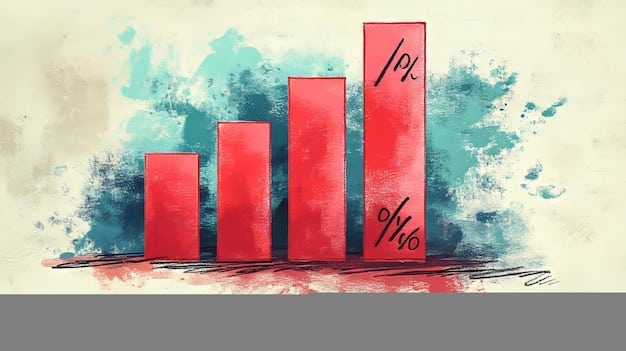How 2025’s 3.2% Inflation Will Squeeze Your Budget

The projected 3.2% inflation increase in 2025 will likely impact personal budgets by raising the cost of everyday goods and services, potentially reducing disposable income and requiring adjustments to spending and saving habits.
Navigating the complexities of personal finance requires a keen understanding of economic trends, and the projected 3.2% inflation increase in 2025 is a trend that demands attention. How Will the Projected 3.2% Inflation Increase in 2025 Impact Your Personal Budget? It’s a question many Americans are asking, and this article aims to provide clear, actionable insights.
Understanding the Projected 3.2% Inflation Increase
Inflation, the rate at which the general level of prices for goods and services is rising, plays a crucial role in shaping your financial well-being. A projected 3.2% inflation increase in 2025 means that, on average, things will cost 3.2% more than they do now. Understanding this projection is the first step in preparing your personal budget for the changes to come.
While a 3.2% increase might seem modest, its cumulative effect across various sectors of the economy can significantly impact your spending power. Let’s delve deeper into what drives inflation and why this particular projection is significant.
What Causes Inflation?
Inflation isn’t a random occurrence; it’s driven by various economic factors. Here are some of the primary causes:
- Increased Demand: When demand for goods and services exceeds supply, prices tend to rise. This is often referred to as “demand-pull inflation.”
- Rising Production Costs: If the cost of raw materials, labor, or other inputs increases for businesses, they may pass those costs on to consumers in the form of higher prices. This is known as “cost-push inflation.”
- Increased Money Supply: When the amount of money in circulation increases faster than the economy’s output, it can lead to inflation as more money chases the same amount of goods and services.
Why the 2025 Projection Matters
A 3.2% inflation rate in 2025 is significant for several reasons. Firstly, it affects the purchasing power of your money. Secondly, it influences investment strategies and savings plans. Finally, it can impact economic growth and employment rates.

By understanding the causes and implications of inflation, you can make informed financial decisions to protect and grow your wealth.
In conclusion, grasping the fundamentals of inflation and the significance of the 2025 projection is essential for effective financial planning. Equipped with this knowledge, you can anticipate and mitigate the potential impact on your personal budget.
How Inflation Affects Your Everyday Expenses
The most direct impact of inflation is on your everyday expenses. As prices rise, the same amount of money buys fewer goods and services. This means you’ll need to allocate more of your budget to cover essential items like food, housing, transportation, and healthcare. Understanding how each of these areas is affected can help you prioritize your spending and make necessary adjustments.
Let’s examine the specific ways inflation can affect these key areas of your budget:
Food Costs
Grocery bills are often one of the first places consumers notice the effects of inflation. As the cost of agricultural inputs, transportation, and packaging increases, these costs are passed on to consumers. This can lead to higher prices for everything from produce and dairy to meat and processed foods.
Housing Expenses
Whether you rent or own a home, inflation can impact your housing expenses. Rent prices may increase as landlords adjust rates to reflect higher operating costs. For homeowners, property taxes and the cost of home maintenance and repairs can also rise.
Transportation Costs
Inflation can drive up the cost of transportation in several ways. Gas prices are directly affected by inflation, as are the costs of vehicle maintenance and insurance premiums. Public transportation fares may also increase.
Healthcare Costs
Healthcare is another area where inflation can have a significant impact. The costs of medical services, prescription drugs, and health insurance premiums tend to rise with inflation, putting a strain on your budget.
Being aware of these potential increases allows you to adjust your spending habits and seek opportunities to save money. Consider strategies such as comparing prices, buying in bulk, using coupons, and exploring alternative transportation options.
In summary, inflation’s impact on everyday expenses is multifaceted, affecting everything from food and housing to transportation and healthcare. By understanding these effects, you can proactively manage your budget and make informed financial decisions.
Strategies to Protect Your Budget from Inflation
While you can’t control inflation, you can take steps to protect your personal budget from its effects. Implementing effective financial strategies can help you maintain your purchasing power and achieve your financial goals, even in an inflationary environment. Here are some proven methods to consider:
Here are some actionable strategies to shield your budget:
Investing in Inflation-Resistant Assets
One way to combat inflation is to invest in assets that tend to hold their value or increase in value during inflationary periods. These assets can include:
- Real Estate: Property values often rise with inflation, providing a hedge against rising prices.
- Commodities: Investing in commodities like gold, silver, or oil can offer protection, as their prices tend to increase during inflationary times.
- Treasury Inflation-Protected Securities (TIPS): These government bonds are indexed to inflation, ensuring that their value rises along with the consumer price index (CPI).
Negotiating Salaries and Rates
In an inflationary environment, it’s essential to ensure that your income keeps pace with rising prices. Consider negotiating a raise with your employer or exploring opportunities to increase your income through freelance work or side hustles.
Budgeting and Tracking Expenses
Having a clear understanding of your income and expenses is crucial for managing your budget effectively. Create a detailed budget that outlines your sources of income and your spending habits. Track your expenses closely to identify areas where you can cut back and save money.
By implementing these strategies, you can mitigate the impact of inflation on your personal budget and maintain your financial stability.
To conclude, proactively protecting your budget from inflation requires a combination of strategic investments, income negotiation, and disciplined budgeting. By taking these steps, you can navigate inflationary periods with greater confidence and resilience.
Adjusting Your Savings and Investment Plans
Inflation not only affects your immediate expenses but also your long-term savings and investment plans. As the value of money decreases, it’s crucial to adjust your financial strategies to ensure that you’re still on track to meet your goals. This involves reevaluating your savings rate, investment portfolio, and retirement planning.
Here’s how to adapt your savings and investment strategies:
Re-evaluating Your Savings Rate
With inflation eroding the value of your savings, it’s essential to reassess your savings rate. Consider increasing the amount you save each month to offset the effects of inflation. Aim to save a higher percentage of your income to ensure that you’re still on track to achieve your financial goals.
Diversifying Your Investment Portfolio
A well-diversified investment portfolio can help protect your savings from inflation. Diversification involves spreading your investments across various asset classes, such as stocks, bonds, and real estate. This can help reduce risk and improve your chances of earning a return that outpaces inflation.
Considering Inflation-Adjusted Investments
Certain investments are specifically designed to protect against inflation. Treasury Inflation-Protected Securities (TIPS) are one such option. These bonds are indexed to inflation, meaning their value rises along with the CPI. This can provide a hedge against rising prices and help preserve the value of your savings.

By making these adjustments, you can ensure that your savings and investment plans remain effective in an inflationary environment. Staying proactive and informed is key to achieving your long-term financial goals.
In conclusion, adapting your savings and investment plans to account for inflation is crucial for maintaining your financial health. By reevaluating your savings rate, diversifying your portfolio, and considering inflation-adjusted investments, you can safeguard your future financial security.
The Impact on Retirement Planning
Retirement planning is particularly vulnerable to the effects of inflation. As you approach retirement, it’s essential to factor in the potential impact of rising prices on your future expenses. Failing to account for inflation can lead to a shortfall in your retirement savings, making it difficult to maintain your desired standard of living.
Consider these aspects of retirement planning in an inflationary environment:
Estimating Future Expenses
To accurately plan for retirement, you need to estimate your future expenses. Take into account not only your current spending habits but also the potential for inflation to drive up costs over time. Consider using an inflation calculator to project how much your expenses are likely to increase in the years leading up to and during retirement.
Adjusting Withdrawal Rates
When you start withdrawing from your retirement savings, it’s important to adjust your withdrawal rate to account for inflation. A common rule of thumb is the 4% rule, which suggests withdrawing 4% of your savings in the first year of retirement and then adjusting that amount each year to account for inflation. However, it is important to note that your individual circumstances may require a different approach.
Considering Social Security and Pensions
Social Security benefits and pensions can provide a valuable source of income during retirement. However, it’s important to understand how these benefits are affected by inflation. Social Security benefits are typically adjusted annually to reflect changes in the CPI, which can help protect your purchasing power. Pension payments may or may not be adjusted for inflation, so it’s essential to review the terms of your pension plan.
Careful planning and proactive adjustments can help ensure that you have enough savings to enjoy a comfortable retirement, even in an inflationary environment.
In summary, addressing the impact of inflation on retirement planning is crucial. By estimating future expenses, adjusting withdrawal rates, and considering Social Security and pensions, you can secure your financial future and enjoy a comfortable retirement despite rising prices.
Seeking Professional Financial Advice
Navigating the complexities of personal finance in an inflationary environment can be challenging. If you’re unsure how to protect your budget or adjust your financial plans, consider seeking professional financial advice. A qualified financial advisor can provide personalized guidance and help you make informed decisions based on your individual circumstances.
Here’s how a financial advisor can assist you during inflationary times:
Assessing Your Financial Situation
A financial advisor can help you assess your current financial situation, including your income, expenses, assets, and liabilities. This assessment can provide a clear picture of your financial strengths and weaknesses, allowing you to identify areas where you need to make changes.
Developing a Customized Financial Plan
Based on your financial assessment, a financial advisor can develop a customized financial plan tailored to your specific goals and circumstances. This plan may include strategies for budgeting, saving, investing, and managing debt.
Providing Ongoing Support and Guidance
A financial advisor can provide ongoing support and guidance to help you stay on track with your financial goals. They can also help you make adjustments to your plan as needed to account for changes in the economy or your personal circumstances.
Seeking the expertise of a financial advisor can provide you with the knowledge and confidence you need to navigate inflationary periods successfully and achieve your long-term financial aspirations.
In conclusion, seeking professional financial advice can be a valuable step in protecting your budget and securing your financial future during inflationary times. A qualified advisor can provide personalized guidance and support, helping you make informed decisions and achieve your financial goals with confidence.
| Key Point | Brief Description |
|---|---|
| 💰 Impact on Expenses | Everyday goods and services will cost more, potentially reducing disposable income. |
| 📈 Budget Strategies | Adjust spending habits, seek savings, and explore price comparisons. |
| 💼 Investment Options | Consider inflation-resistant assets like real estate or TIPS. |
| 🕰️ Retirement Planning | Re-evaluate savings, adjust withdrawal rates, and consider Social Security. |
Frequently Asked Questions (FAQ)
What is inflation?
Inflation
What is inflation?
Inflation is the rate at which the general level of prices for goods and services is rising, and subsequently, purchasing power is falling.
What is inflation?
Inflation is the rate at which the general level of prices for goods and services is rising, and subsequently, purchasing power is falling.
How does inflation affect my personal budget?
Inflation can increase the costs of everyday items, like groceries, gas, and utilities. As prices for these items go up, your budget may shrink as you have less money to spend on other things. Furthermore, you may need to re-evaluate your savings goals to account for the increasing cost of living.
How can I protect my budget from inflation?
Several strategies exist. These can include cutting unnecessary expenses, adjusting savings goals, and investing in inflation-resistant assets like TIPS, REITs, gold, and value stocks.
How can I ensure that my retirement is prepared for inflation?
Ensure that you are saving enough to outpace the effects of inflation so that your standard of living is not at risk. Consider consulting with a financial advisor.
What is deflation?
Deflation is the opposite of inflation; it occurs when the general price level decreases. It, too, can be problematic.
Conclusion
In conclusion, understanding and preparing for the projected 3.2% inflation increase in 2025 is crucial for maintaining financial stability. By implementing proactive strategies like budgeting, investing in inflation-resistant assets, and seeking professional advice, you can mitigate the impact on your personal budget and achieve your financial goals.





